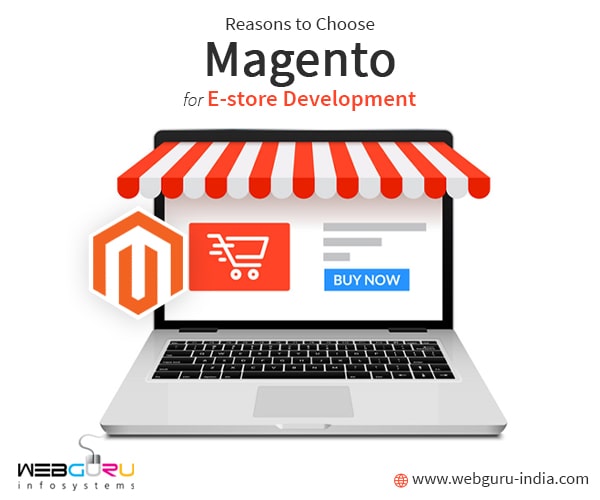Home Blog Ecommerce Website Development Why Choose Magento for eStore Development
Why Choose Magento for eStore Development
- 09 Mar / 2021
- 3,917 views

While creating an eCommerce website, you will have numerous choices as far as the platforms you may use are concerned. Each platform has its advantage and the robustness of your e-store will depend on the one you choose.
Magento is a much sought after CMS for eCommerce web development. Today, we will take a closer look at why you should choose Magento for creating a robust e-store.
1. Open Source
Magento has two editions – Magento Community Edition and Magento Enterprise Edition. You can use Magento Community Edition absolutely for free. You can also find a large repository of Magento modules at Magento Connect Marketplace that help to integrate new features in your e-store. Being an open-source platform, it doesn’t require you to spend much, just the development cost.
2. High Reliability
The first thing you should pay attention to while searching for an eCommerce platform is its reliability. Numerous leading businesses use this platform to power their online stores. This speaks volumes of its reliability in creating a high traffic-driven e-store.
3. Large Community Support
Magento has a strong community support comprising expert developers from around the world. While developing a Magento based eCommerce website, you can always count on the community to help you out by providing proper guidelines and fixing a particular issue. The members of the community also keep the developers updated with the latest trends.
4. Multiple Payment Options
One of the most crucial aspects of an eCommerce website is integrating popular payment options. A wide range of payment choices enhance the customers’ experience. Magento supports almost all the popular payment methods like PayPal, bank transfer, Amazon Pay, etc.
5. SEO-Friendly Platform
Magento is an SEO-friendly platform packed with default features like sitemaps, canonical tags, rich snippets, SEO-friendly URL structure, improved layered navigation optimization etc. Integration of SEO plugins and extensions will further make your site easily crawlable by search engine bots and help it to rank higher.
6. Multiple Storefronts
Magento allows you to set up multiple stores. All the stores may share the same domain, have a completely different domain, be set up as subdomains of the same domain, and share the same backend for easier administration.
If you are a vendor who deals with both B2C and B2B customers, you may develop two distinct storefronts for your audiences. You can also create multiple storefronts for different geographic regions (say, one for India and another for the USA). Magento also supports multilingual storefront development including multi-currency features.
7. End-to-End Functional Testing
An eCommerce website should go through a rigorous Quality Assurance process to ensure a rich user experience. This is needed to identify and fix any glitches and eliminate vulnerabilities. Magento Functional Testing Framework (MFTF) performs automated end-to-end functional testing to minimize the effort it takes to perform regression testing. Automated tests are done for checking the storefront and admin panel UI, measuring total page load times in the browser, and more
8. Advanced Security
Since the customers’ personal details like debit/credit card details, home address, contact number, etc. are added in an e-store database, adhering to various web security standards is of paramount importance for an eCommerce website. And Magento actively facilitates it. With each of its new version, Magento offers more security features to maintain strict data confidentiality. Further, Magento has a directory named ‘pub’ that shields the website’s code from malware attacks.
Below are some points to get a fair idea about why Magento is the ideal choice from the aspect of site safety:
- Two-factor authentication to improve admin login security
- Blocking option for unwanted demographic regions
- Customized admin path to reduce the rate of security breaches
- Strict monitoring of the roles of the administrative users
9. Swiftness
A reduced loading time is considered as an advantageous aspect for an eCommerce website. Here, Magento scores big with its compatibility with Varnish Cache.
Varnish Cache is an open-source web application accelerator. It stores files in memory and reduces the network bandwidth consumption and site response time in future. Magento supports Varnish versions starting from 3.0.5. By reducing the loading time of a page, Varnish Cache helps to reduce the bounce rate.
10. Mobile Responsive
Shopping on an eCommerce website via mobile devices is commonplace these days. Magento is a great platform to build a responsive website. It supports HTML5 to enhance the shopping experience on a mobile device and modify picture sizes and support videos.
11. Third-Party Integration
Magento allows you to integrate a large number of third-party APIs into your online store. These include payment gateways, shipping, marketing, and more. You can integrate MailChimp, PayPal, eBay, etc. You may also integrate a WordPress blog in Magento based e-store using FishPig Magento WordPress Integration module. Further, Magento offers built-in tools like Google Analytics to help you monitor the site’s performance.
12. Stability
The latest release of Magento 2.4 has brought groundbreaking changes to facilitate high-end eCommerce store development. Magento is architected to meet the requirement of stability and scalability as a business grows. This is why large enterprises prefer to hire Magento developers to build a robust e-store.
Way Forward
The above-mentioned points make it clear why leading firms around the world rely on Magento while creating their online stores. If you want to join the league, it’s high time to engage a professional eCommerce website development company and get your job done!

Soumi Bhattacharya
Soumi Bhattacharya is an experienced content developer & keen observer of all things digital. Analyzing the latest trends in technology is her forte.
4 comments
Leave a Reply

-
1000+
Happy
Clients -
25+
Countries
Served -
20+
Years of
Trust








Informative & Nice blog
Informative post
Thank you for sharing your blog, seems to be useful information
Informative Blog. Thank You!